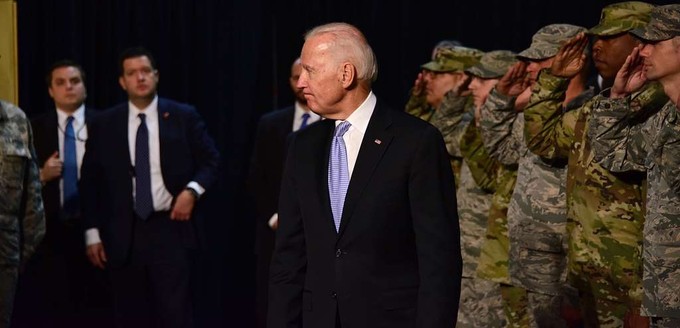A Quarter of Biden’s Budget Will Go to Pentagon Contractors
By
Lindsay Koshgarian
Posted:
|
Military & Security

Photo of (then former VP) President Joe Biden with National Guard troops in 2017. Courtesy of Defense Visual Information Distribution Service.
March 9 - Today the White House released the President’s budget request, laying out the President’s priorities for the country.
The $1.6 trillion discretionary spending request includes an eye-popping $886 billion for the Pentagon and military. This means that more than half - 52 percent - of the proposed discretionary spending is for the military and war. Almost half of that - or about a quarter of the total discretionary budget - will go to Pentagon contractors.
“This military budget represents a shameful status quo that the country can no longer afford. Families are struggling to afford basics like housing, food, and medicine, and our last pandemic-era protections are ending, all while Pentagon contractors pay their CEOs millions straight from the public treasury,” said Lindsay Koshgarian, Program Director for the National Priorities Project at the Institute for Policy Studies.
While more than half of the federal discretionary budget under the president’s proposal would go to the military, fully two-thirds would go to a combination of the military, veterans’ programs, and heavily militarized homeland security programs.
That includes funding for two agencies, Immigration and Customs Enforcement (ICE) and Customs and Border Protection (CBP), that were flashpoints under the Trump administration. Those agencies are responsible for the millions of deportations that have separated families and devastated immigrant communities, and for militarized border enforcement that has led to unnecessary deaths and abuse of migrants at the southern border.
Rather than proposing a desperately needed overhaul of our immigration system, the President’s proposal doubles down on a failed, punitive border strategy by funding these agencies at levels comparable to the previous administration.
After all that, only one in three federal discretionary dollars under the Biden budget would be available for human needs and community programs like affordable housing programs, public education, and public health.
The Biden administration ended the twenty-year war in Afghanistan in 2021, but the country has seen no savings from the end of its longest active war. Instead, the U.S. has continued to spend as much as the next nine countries combined on its military while underfunding domestic programs.
“A responsible budget would restore the Pentagon’s spending to previous reduced levels from just a few short years ago, and reinvest that additional money at home where we need it the most,” said Koshgarian.